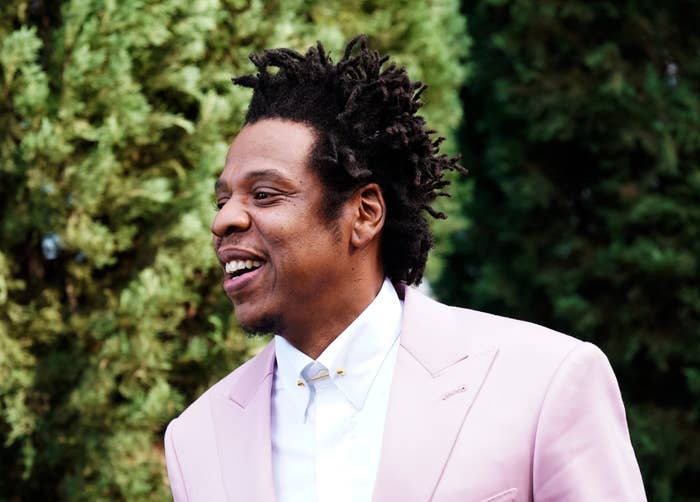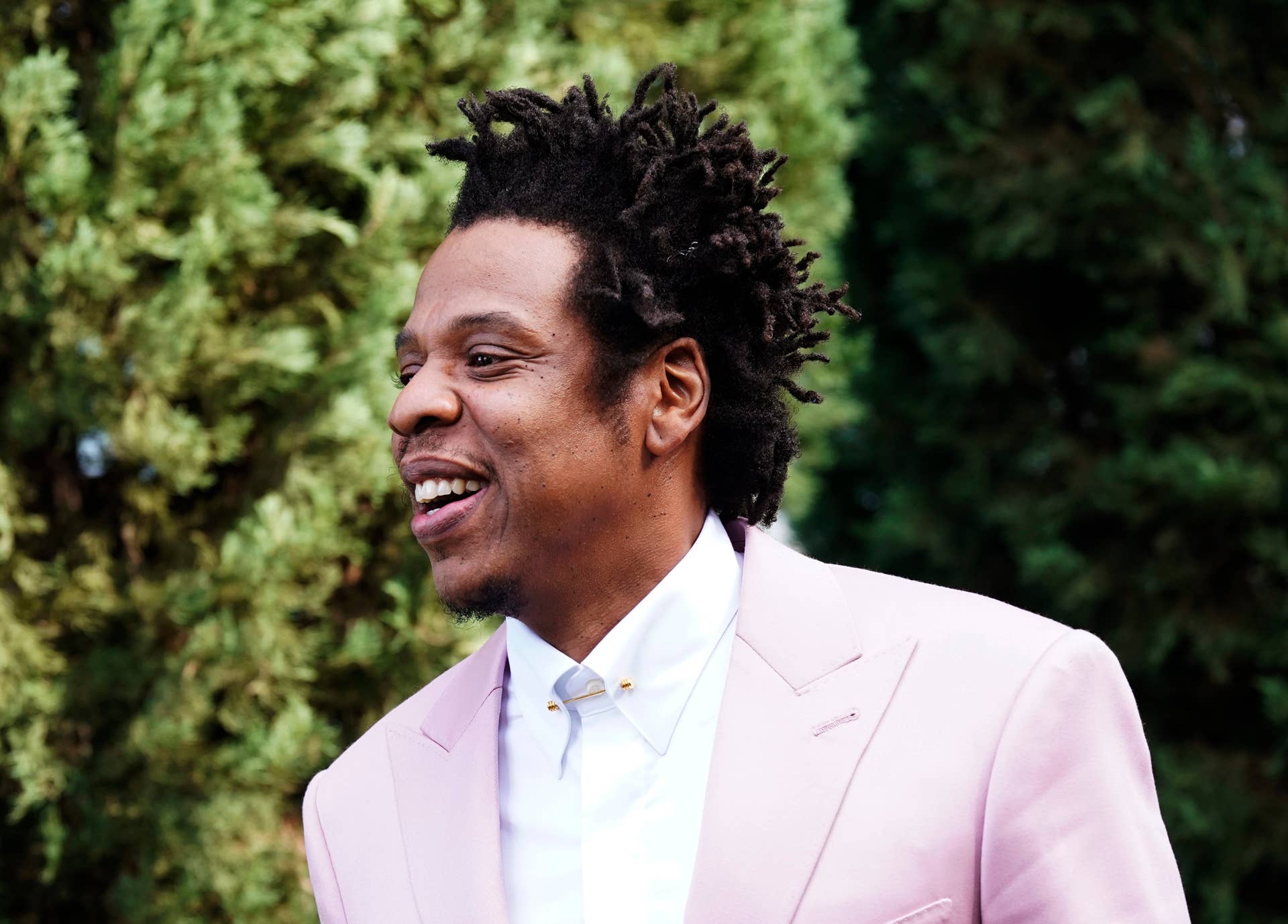
JAY-Z would like to draw as little attention away from Jay Electronica as possible.
On A Written Testimony, Electronica’s debut album released last Friday after a decade-plus wait, JAY-Z is more phantom than featured guest. He’s completely unlisted on the eight tracks that he appears, even the previously-released “Shiny Suit Theory.” And on release night, when social distancing relegated a planned three-city listening party to Jay Elec simply livestreaming from the studio, Jigga never appeared before the camera. His presence was not seen, only fleetingly heard. And yet, JAY-Z is the first rapper you hear on the album. Good intentions notwithstanding, his presence is, unsurprisingly, too commanding to ever fully cede a spotlight.
Does JAY-Z outrap Jay Electronica on his own album? To even debate so may be derisive and besides the point. (Even so, they don’t call him the GOAT for nothing.) What matters is how he sounds on it—as energized, locked in, and inspired as ever. These aren’t autopilot raps designed to capitalize on the moment and event-ize the album as much as possible. Testimony is the culmination of a journey eleven years in the making for Jay Electronica (and with it being his debut, theoretically a summation of his life experiences up to this point as well). But Hov shows up just as eager, if not moreso, to get some bars off his chest.
It’s been almost three years since JAY-Z’s last solo album, almost two since his last project, and a year and a half since his last verse. In that time, he’s reached his self-mythologized billionaire milestone, continuously challenged music industry norms while positioning Roc Nation as an avenger for mistreated artists, and yes, entered into one of the most controversial partnerships in recent history by forging an alliance with the NFL, a highly scrutinized deal many critics wrote off as peak sellout behavior. As soon as critiques rolled in, it became clear that the first JAY-Z verse/song/project to follow would contain some slickly worded PR, as he’s always done in these instances, with more verve than any press release could contain.
Most importantly, though, he’s having fun. Jay Electronica isn’t just an artist on his label and an asset in this equation, he’s a rapper JAY is an admitted fan of, someone many would call a peer (skillswise at least) off the strength of the “Exhibits” alone. JAY knew that much when they collaborated for the first time, nine years ago on “Shiny Suit Theory,” rising to the occasion and delivering one of his best verses (guest feature or otherwise) to date.
On A Written Testimony, JAY-Z keeps that same energy. His verse on “Ghost of Soulja Slim” wastes no time setting the tone and energy for the project: “Next time you bring up the gods, you gon respect us/that lil vest ain’t gon do you, I shoot from neck up.” From there, it’s off to the races. JAY starts every subsequent verse with the same fire, sauntering onto each track like Vince McMahon. There’s a flex on behalf of his son, yet another salute to Emory, and a declaration of, “I’m a miracle, born with imperial features,” which, paired with The Alchemist’s beautiful instrumental, sounds like the fucking clouds parting and heavens opening up on wax. He also tries out a new flow on that song, and later trots out another double-time effort on “Flux Capacitor.” The results aren’t always as smooth, but it’s hard to care when the bars are as tight as “She sneeze at son, her photic reflex” or “You backstabbers gon turn me back to the ol Jay.”
Still, the notion that this is a “new JAY-Z EP” is a fallacy. (For one, he only handles hook duty on the last two songs.) With Jay Electronica handling the bulk of the production, this is very much still his arena. Hov is playing on Jay Elec’s turf sonically and thematically. This is the most concentrated dose of NOI influence and teachings we’ve heard from JAY-Z on one project so far. Some would chart this course back to 4:44, but in this case, as it was with most of the themes on that album, they’ve always been in Jay’s music, just less pronounced. It was alongside Electronica that he first turned heads with Nation of Islam references, as the pair toe-tagged “We Made It” back in 2014, and he rapped “All praises due/I’m ready to chase the Yakub back in the caves.” That’s to say nothing of 2013’s MCHG, where he rapped “Arm, leg, leg, arm, head—this is Godbody.” Six years later, their reunion on wax sees Hov furthering the militant and capitalist themes he emphasized on 4:44 with an added NOI twist: “P.S., we born perfect, fuck all the b.s./everybody wanna be us for real, we just gotta see us/Insha’Allah.”
What the two Jays do on A Written Testimony may not be as seamless as Rae and Ghost on Only Built 4 Cuban Linx, or as much of an even 50-50 split as Watch the Throne, but it is complementary nonetheless. Every verse is in service of the album’s main themes of sacrifice, self-affirmation, loss, and black self-sufficiency. JAY’s chorus on “A.P.I.D.T.A.” has the potential to be a powerful point of reference for the next time the culture collectively mourns a loss; and in no way does it diminish the potency of Jay Electronica’s verses about his departed mother. If Jay Elec seems to inspire Hov to stay on his A-game, JAY in turn provides a foundation for whatever the song needs—verse, hook, refrain—to make Electronica comfortable enough to finally present his own musings to the world. It’s a cheat code, as he gleefully acknowledges—“man, this is highway robbery”—but if the end result is a project this rewarding, then who’s keeping score?
Coming in during a lightweight Hov hiatus, though, A Written Testimony also serves as a snapshot into where his head’s at these days. “A.P.I.D.T.A.” was made the night Kobe died, but you can hear the weight of several cultural losses of late, JAY’s friends, weighing on him in his social media screed on “Flux Capacitor” (which, ironically, is already the most-shared bar from the album so far). And while that song has the showiest, most direct NFL response, “Universal Soldier” contains his underlying sentiment toward criticisms of his wealth and what he chooses to do with it in pursuit of more: “That guilt trip ain't go' work, don't put your luggage on we/You ain't keep the same energy for the du Ponts and Carnegies.” It’s a tricky defense tactic, one I’d be intrigued to hear him continue to tackle further and deeper on his own.
Testimony leaves the listener cautiously optimistic that it might herald an, I don’t know, 80% shorter release window for Jay Electronica’s projects in the future. But it also has many, myself included, looking forward to JAY’s next solo even more than we already were. Some still express shock that a 50-year-old rapper can still wield this type of anticipation. But when Jay intones, “My time is right now,” he may as well be Doctor Manhattan. It’s always his time.


